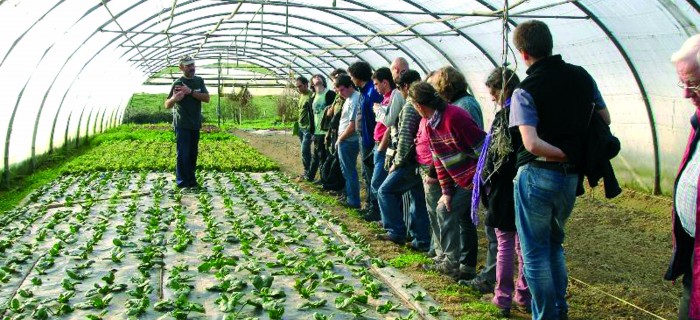Food Sovereignty in Practice in the Basque Country
Food First Backgrounder, Fall 2013, Vol. 19, No. 3
“Food Sovereignty is a right and a utopia that helps us change society. It is the right of all peoples to decide on their means of production and what they eat. In order for this right to exist, we must change all the social and political structures we have today. It is a struggle against the system and a struggle for good livelihoods.” – Estibaliz Redondo, EHNE-Bizkaia
It has now been twenty years since La Vía Campesina coined the term Food Sovereignty, defining it as the right of all peoples to decide on their food systems from production to consumption, based on agroecology and organized for the construction of local and national sovereignty. EHNE-Bizkaia—the Basque union of small farmers and ranchers—has been working to advance food sovereignty since Vía Campesina’s foundational congress in 1993. In Euskal Herría (the Basque Country) the struggle for food sovereignty is embedded in a broader struggle for political and cultural autonomy, drawing on a long history of Basque resistance against fascism and state-sponsored repression. A strong model of local cooperative food production thrives in the region, as part of a framework of community empowerment and solidarity economy.
When we talk about, define and explain food sovereignty, many people see it as a utopia because it clearly means we have to go beyond the existing laws of the global market and the agroindustial model of production to construct a real alternative based on the clear political position that prioritizes people and the environment above the interests of multinational corporations. Years after defining the term, we now see clear examples that demonstrate that alternative market models based on collaboration, commitment and mutual aid between producers and consumers is possible. The organizations that work to build this alternative model are using different tools, affirming a model of change, and showing us that we can do things differently.
Food Sovereignty is more than just a new proposal for our relationship with the land… It’s also a way of relating with our own community.
One example is the Red Nekasarea, a project of EHNE Bizkaia, started in 2007 to establish direct links between production and consumption. In less than 10 years, policies that favored big box stores and big infrastructure had covered 13 percent of the Basque Country under a layer of cement, leading to a dramatic loss of environment and livelihoods in the countryside. Something had to be done. In this context, we created a network of producers and consumers that were not only sellers and customers but mutual aid groups in which everyone was equally responsible for the food system.
The change of vision needed to form these groups required a lot of work—primarily education—with the producers in order to understand that they needed to do things they hadn’t done before like spending time communicating with their group or distributing planned, weekly food baskets (cestas). Those who receive the food are not just “customers,” but people who are actively concerned with the day-to- day work of the farmer and who collaborate in production at different times throughout the year. Though this model seemed utopian in 2007, today it provides 800 families with food baskets produced by 80 farmers who plan production based on mutual agreements with consumers.


 Help Food First to continue growing an informed, transformative, and flourishing food movement.
Help Food First to continue growing an informed, transformative, and flourishing food movement.




